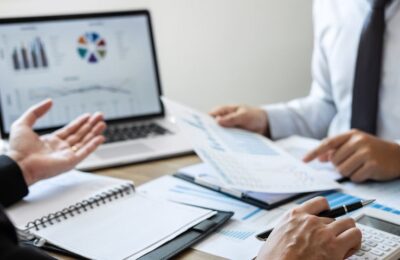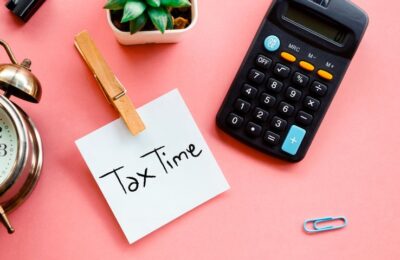We all know the quote, “nothing can be said to be certain, except death and taxes.” And Benjamin Franklin was spot on. If you’re a sole trader and you run a small business, you’ll need to pay tax. So small business tax planning is important. Here are some top tips for sole traders to help you navigate business taxes and avoid any taxing, last-minute panic.
How much do I need to earn before I pay tax?
Before we go any further, it’s worth noting that the income tax threshold for the 2023/24 tax year is £12,570. That’s what you can earn before you have to pay income tax.
How is business tax calculated?
If you’re a sole trader (around 70% of UK small businesses are) and your net profit is between £12,571-£50,270, assuming you have no other taxable income then you’ll pay the basic income tax rate of 20%.
Above £50,270, but below £125,140, the 40% income tax rate applies. There is an additional rate of 45% payable on profits and other taxable income above £125,140. Income tax bands are different in Scotland, however.
The other effective “tax” that will be due is Class 2 or Class 4 National Insurance, providing your profits aren’t below £6,725. You can make voluntary payments though, even if you don’t have enough earnings to pay NI, which avoids gaps in your National Insurance record. Gaps can affect your State Pension, so it’s worth continuing to pay if you’re able.
Small business tax planning tips
Your tax planning strategy should aim to achieve one or more of these goals:
- Reducing the amount of taxable income
- Lowering your tax rate
- Controlling the time when the tax must be paid
- Claiming any available tax credits
- Avoiding common tax planning mistakes
Here are some ideas that could help to achieve the above.
-
Carry forward losses
If you’re self-employed and using cash basis accounting, you can carry forward any losses from a really bad year and offset them against profits from the next. This brings down your tax bill. If you cease trading and make losses in the final 12 months, there is also a special loss relief you can use.
-
Claim everything you are entitled to
As a sole trader, you can claim back your tax allowable expenses. These include a percentage of the running costs of a vehicle, your home office costs and the costs of running your business premises.
If you work from home the majority of the time, you can claim back a proportion of your bills, including water rates and electricity; phone bills and internet costs. You can work this out by looking at utility bills and the number of rooms the property has, and which of those rooms you use for work. But there is a simpler way. You can claim a flat rate allowance per month for your light, heat and power.
It depends how many hours you work from home each month:
25-50 hours: £10 per month
51-100 hours: £18 per month
101 hours or more: £26 per month
This example is provided by HMRC:
You worked 40 hours from home for 10 months, but worked 60 hours during 2 particular months:
10 months x £10 = £100
2 months x £18 = £36
Total you can claim = £136
Do you run a guest house? If you also live in the property, there is another method of simplified expenses you can use.
And if you’re a self-employed electrician, for example, you can claim tax relief on any protective clothing or uniform you may need. If you’re a Lilly Savage tribute act, you can claim tax relief on your costume! You might be surprised what can be included, so make sure you go through everything with your accountant.
-
Manage your personal taxes – pay more into your pension
As a sole trader, any costs associated with your business are your liability, so it’s important to make your personal finances part of your small business tax planning.
One way you can help is by paying into your pension. If you’re a basic rate taxpayer in England then the government will top up your pension contribution by 20%, meaning a pension contribution of £80 is actually worth £100. And if you’re earning over £100,000, you can use pension contributions to reduce your taxable income and avoid losing your personal allowance.
If your taxable income is at a level where you are paying tax at 40% or 45% paying more into your pension is an incredibly tax efficient way of providing for your retirement as a large chunk of your contribution is actually being funded by the government!
Put money into an ISA. You can save up to £20,000 into a Cash ISA, a Stocks and Shares ISA, an Innovative Finance ISA, or any combination of the three. Any money paid in up to this amount is exempt from Income Tax and Capital Gains Tax whilst in the plan, and no tax is payable when you withdraw it.
How can I minimise last minute panic?
The best way to minimise panic, is to avoid turning up at your accountant’s door a week before your tax return is due. Build up a relationship with your accountant ahead of that. Talk them through your business and your estimated income for the next few years. It will help your accountant to find the best tax plan for your small business.
Keep a good record of purchases and any expenses, so they are easy to see when it comes to completing your self-assessment tax return. Using cloud accounting software, like Xero or FreeAgent makes recording your financial information so much easier. And switching to cloud accounting isn’t as difficult as you might think.
Do I need an accountant for small business tax planning?
If you’re not working with an accountant, the chances are you could pay less tax if you did. Small business tax planning can be a minefield. Do you know if you need to be set up for VAT? Are you prepared for MTD and using the necessary accounting software? An accountant should be able to help with these questions and more. They can also help you to grow your business and seek out new opportunities.
About Karen Jones
Having worked for one of the world’s largest accountancy firms, Karen Jones uses her tax knowledge and skills to help clients obtain substantial reductions to their tax liabilities.
With an expanding portfolio of tax clients, Karen enjoys the variety her work brings her and particularly likes working with new businesses and people. With a growing number of tax clients, she frequently faces a variety of challenges and relishes the experience she gains as she solves them.
Karen likes the THP ethos: “I like the way the team has a professional, but friendly and down-to-earth approach – it creates a productive atmosphere that benefits everyone.”
Karen’s specialist skills:
- Personal Taxation
- Tax Efficient Planning
- Trust Administration












